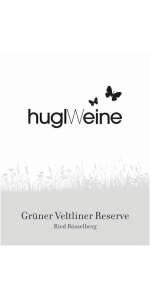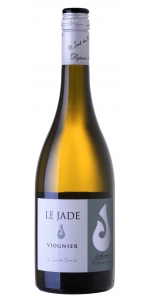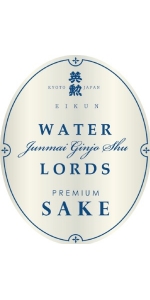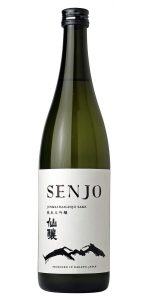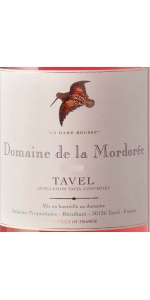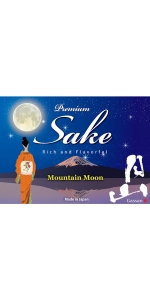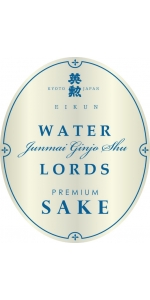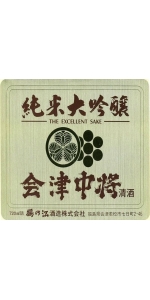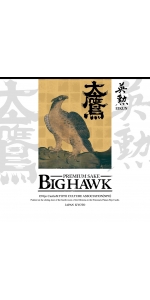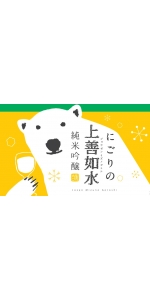Sake Gassan Junmai Ginjo Mountain Moon (720ml)
6 bottles with free shipping for: $228.00
12 bottles with free shipping for: $396.00
| BUY MORE! SAVE MORE! | ||||||||||||||||||||
|
| Country: | Japan |
| Region: | Shimane |
| Winery: | Yoshida Brewing Company |
| Grape Type: | Simaneken Gohyakumankoku (Sake) |
| Vintage: | NV |
| Bottle Size: | 720 ml |
Woodsy honeycomb, nutshell, and mushroom patch aromas with a satiny fruity-yet-dry medium-to-full body and a delicate savory mushroom stock, chestnut, and golden beet driven finish. A fine choice for tempura. 91 Points -Beverage Tasting Institute
RATING: 91 points (Exceptional)
CATEGORY: Junmai Ginjo Sake, Sake
ALCOHOL BY VOLUME: 15.4%
TASTING LOCATION: In Our Chicago Tasting Room
TASTING DATE: Dec-05-2012
WINE ID: 200767
The Award Winning Sake Brewery
Gassan, also known as Yoshida Sake Brewing Co., Ltd., is located in the small village of Yasugi. Yasugi is in the very Southernmost Japanese Prefecture of Shimane. The Kura or brewery was founded in 1743 and present owner Tomonori Yoshida-san's family took over the property in 1826; hence Yoshida-san is the 5th generation of family involvement and ownership with the Kura.
Over 200 years ago around Yasugi, the Amago-clan was reigning over the Sanin district. There, the clan established a castle where the feudal lord of Amago resided in the Age of Civil Wars. "GASSAN", took its premium sake brand name from the mountain in this area. Their time-honored tradition of sake brewing was established by special permission from the feudal lord of the House of Hirose. They have proudly maintained this tradition, handing down brewing secrets from generation to generation for over 180 years.
Their sake has received the gold award over ten times at the "Zenkoku Shinsyu Kanpyou Kai" (National New-Brewed Sake Contest), the foremost and authoritative contest in the Sake industry.
Gassan produces Tobin Sake or competition sakes from 18-liter tobins. The Tobin sake is very limited in production, but is marketed.
About their Fine Sake
Production is small at 700 Koku (or 14,000 9-liter cases in wine terms). Seven sake types are produced here by the ageless Master Toji, Tanaka-san, who is 84 years young. At artisanal breweries like Gassan water is all important and sure enough all of the water is sourced from mountain springs around Yasugi.
Typical of Western Style Sakes, their Nihon-Shu is big boned, rich and round, and balanced with lactic acid.
Why they got so many awards?
To make quality sake, it really depends on (1) Water, (2) Sake Rice, (3) Toji's Skill.
1. The Water Source:
Their sake is brewed with fine and super soft water, which the lord of the House of Hirose used in their tea ceremonies at the end of Edo period. (late 1800s)
The water Gassan uses for their sake is recognized as one of the best 100 waters in Japan. It was also known as one of the highest quality water in the "Fumai-style tea ceremony". Furthermore, as water varies according to climate conditions, we specially blend in other water sources to precisely control water hardness to maintain our exacting brewing requirements.
2. The Sake Rice:
Gassan does not hesitate to use high quality rice even though it may cost them. They focus on making outstanding sake for sake lovers. The sake mai or rice types used are:
- Yamada Nishiki
- Gohyakumangoku
- Sakanishiki
- Kairyoomachi
- Kannumai
3. The Master Toji's skills are superior to others:
The Master Toji Tanaka-san, is certified as "Modern master craftsman" by Ministry of Health, Labor and Welfare. The highly skilled people (a wide variety of things such as an entertainment, food, Metalwork, machine appliance assembling, repair, the sewing of clothes, carpenter) can be certified as "modern master craftsman " that Japanese government wants Masters to pass the technique to the younger generation.
Tanaka-san is also passing all of his skills to younger toji, Adachi-san. The uniqueness of Gassan is the mixture of Classic and Modern Toji skills that effect the flavor in the end.
This is the certificate of "Seishu Senmon Hyoukasha" (Sake Expert Assessor) that Tomonori Yoshida-san holds. There are about only 50 people who are certified. Out of all the 50, Yoshida-san is the Second person of the beginning. This certificate is presented by Alcoholic beverage research institute, the best liquor research organization in Japan. Whoever certified as Sake Expert Assessor, they can be called top taster, just like Master Sommelier in Wine world. Because the exams are so difficult, there are still only about 50 people certified.
Currently, there are about 1300 Kura exist in Japan, but most Kurabito (brewery people) do not hold such certificate. You need not only knowledge of sake, but also tasting skills to be certified. The producer, Yoshida-san is giving a 100% effort to create high quality sake.
Above all results, Gassan's sake is world-class sake
Gassan's sake is very easy and smooth to drink. Their constant pursuit of perfection has led to success at a national level. Now this high quality sake is available in the US.
Hugl Rosselberg Horse Hill Gruner Veltliner is made from 100% Grüner Veltliner
A powerful, very ripe Grüner Veltliner, intense and full-bodied with a long finish.
The ripe grapes are processed very gently with 12 hours on the skins and then vinified in Stainless Steel tanks. No Oak.
A firm mineral backbone, gives it the strength of character to work well with many cuisines.
Le Jade Viognier is made from 100 percent Viognier
The wine comes from sun-drenched vineyards planted on the best terroir - specially selected for its physical and geographical characteristics - on clay and limestone hillsides called "costières" (coastal region). The vineyards are only a few miles away from the Etang de Thau, a coastal lagoon that is situated between the port of Sète and Marseillan.
The color is a wonderful brilliant yellow with pearl tints. Intense and seductive aromas of ripe fruits, especially apricot, and floral notes with a hint of rose petals. The texture is very harmonious, generous, round and long. The finish is long and balanced with a good freshness.
Perfect as an aperitif, or great with richer dishes like langoustines, smoked or marinated salmon. Great too with guinea fowl in creamy or curry sauce. Serve it also with a broccoli and Roquefort soup or for dessert with a mango and pineapple tarte Tatin. An extremely versatile wine!
Sake Eikun Junmai Ginjo Water Lords is made with Iwai rice.
Eikun sake uses water from a source called "Fusui", rated as one of the top 100 sources of water in Japan. This water source is located just south of the ancient Japanese, and still cultural capital of Japan, Kyoto.
Aromas of macadamia oatmeal cookie, spicy zucchini bread, and vanilla cream with a satiny fruity-yet-dry medium-to-full body and a layered, banana custard, jicama, salted whole nut, apple, and radish nuanced finish. A Wonderfully vibrant and flavorful sake.-Beverage Tasting Institute 94 points (Exceptional)
RATING: 94 points (Exceptional)
CATEGORY: Junmai Ginjo Sake, Sake
ALCOHOL BY VOLUME: 15.3%
TASTING LOCATION: In Our Chicago Tasting Room
TASTING DATE: Dec-05-2012
WINE ID: 200768
Juicy & Refreshing. Full of fruity flavors with clean sweetness. Brewed with Hitogokochi, the special sake rice harvested in Nagano, and natural water slowly filtered down the Japan Alps. In 1866, toward the end of the Edo period, Matsujirou Kurogouchi and his family started a small sake brewery currently called Senjo named after Senjo Ga Take, a 3000-meter peak in the Japanese Alps. Today Senjo Brewery strives to combine art with science and old skill with new technology by adding modern twits to the rich historical traditions of Sake brewing.
Pair with Deep-fried fish with sweet & sour sauce, Young sweetfish tempura (chiayu tempura), Caesar salad.
Mordoree Tavel Rose Dame Rousse is made from Grenache 60 %, Cinsault 10%, Syrah 10 %, Mourvèdre 10%, Clairette 5%, and Bourboulenc 5%.
Nose : steady rose, brilliant and limpid.
Aromas : very complex with flowers, red and white fruits aromas.
Palate : rounded, full bodied with a long lasting aniseed and fruity finish.
Ageing potential : 4 to 6 years
Surface : 9 Ha. Yield : 44 Hl./Ha. Vineyard age : 40 years Terroir : Clay / chalk and sandy with pebble stones. Harvest : by hand Vinification : 100% destemming, cold maceration during 48 h., pneumatic pressing, fermentation at 18° C. Estate bottle
Food pairing: cold meat and delicatessen, poultry, white meats, grilled meats, fried fish, fish soup, pastas, pizzas and all Asian cuisine.
Review:
"Pale watermelon in color, this wine is composed of 60% Grenache, 15% Cinsault, 15% Syrah and 10% Clairette. It has a focused nose of ripe watermelon, cherry skin, blueberry, violets and wild herbs. While the wine has plenty of structure for additional cellaring, enjoy it now with a creamy goat cheese."
- Wine Enthusiast (September 2023), 92 pts
Woodsy honeycomb, nutshell, and mushroom patch aromas with a satiny fruity-yet-dry medium-to-full body and a delicate savory mushroom stock, chestnut, and golden beet driven finish. A fine choice for tempura. 91 Points -Beverage Tasting Institute
RATING: 91 points (Exceptional)
CATEGORY: Junmai Ginjo Sake, Sake
ALCOHOL BY VOLUME: 15.4%
TASTING LOCATION: In Our Chicago Tasting Room
TASTING DATE: Dec-05-2012
WINE ID: 200767
Woodsy honeycomb, nutshell, and mushroom patch aromas with a satiny fruity-yet-dry medium-to-full body and a delicate savory mushroom stock, chestnut, and golden beet driven finish. A fine choice for tempura. 91 Points -Beverage Tasting Institute
RATING: 91 points (Exceptional)
CATEGORY: Junmai Ginjo Sake, Sake
ALCOHOL BY VOLUME: 15.4%
TASTING LOCATION: In Our Chicago Tasting Room
TASTING DATE: Dec-05-2012
WINE ID: 200767
Sake Eikun Junmai Ginjo Water Lords is made with Iwai rice.
Eikun sake uses water from a source called "Fusui", rated as one of the top 100 sources of water in Japan. This water source is located just south of the ancient Japanese, and still cultural capital of Japan, Kyoto.
Aromas of macadamia oatmeal cookie, spicy zucchini bread, and vanilla cream with a satiny fruity-yet-dry medium-to-full body and a layered, banana custard, jicama, salted whole nut, apple, and radish nuanced finish. A Wonderfully vibrant and flavorful sake.-Beverage Tasting Institute 94 points (Exceptional)
RATING: 94 points (Exceptional)
CATEGORY: Junmai Ginjo Sake, Sake
ALCOHOL BY VOLUME: 15.3%
TASTING LOCATION: In Our Chicago Tasting Room
TASTING DATE: Dec-05-2012
WINE ID: 200768
Sake Eikun Junmai Ginjo Water Lords 12/720ml is made with Iwai rice.
Eikun sake uses water from a source called "Fusui", rated as one of the top 100 sources of water in Japan. This water source is located just south of the ancient Japanese, and still cultural capital of Japan, Kyoto.
Aromas of macadamia oatmeal cookie, spicy zucchini bread, and vanilla cream with a satiny fruity-yet-dry medium-to-full body and a layered, banana custard, jicama, salted whole nut, apple, and radish nuanced finish. A Wonderfully vibrant and flavorful sake.-Beverage Tasting Institute 94 points (Exceptional)
RATING: 94 points (Exceptional)
CATEGORY: Junmai Ginjo Sake, Sake
ALCOHOL BY VOLUME: 15.3%
TASTING LOCATION: In Our Chicago Tasting Room
TASTING DATE: Dec-05-2012
WINE ID: 200768
Made with Iwai rice.
Eikun sake uses water from a source called "Fusui", rated as one of the top 100 sources of water in Japan. This water source is located just south of the ancient Japanese, and still cultural capital of Japan, Kyoto.
Rice milling: 60%
This Junmai Daiginjo has a beautiful nose full of banana, melon and star anise. The all natural brewing process gives this sake a bright fresh palate of plum, lime and minerality with a clean dry finish. A very food friendly sake, and is thought to be best after the meal with a light, smooth, rich cow's milk cheese.
POLISHING RATIO: 40%
ALCOHOL: 16-17%
SMV +/-: +1.0
ACIDITY: 1.2
RICE KOJI: HATTANISHIKI
RICE KAKE: HATTANISHIKI
YEAST STRAIN: PROPRIETARY YEAST
FOOD PAIRINGS: Poached Lobster, Seared Scallops, Tofu, Steamed Dumplings
CHEESE PAIRINGS: Brillat Savarin, Cambozola, Dulce Latte Gorgonzola, Mimolette
Rice milling: 60%
Rice varietal: Iwai (Only available in Kyoto)
Alcohol: 15%
Sake meter value: +3.0
Acidity: 1.3
Tasting Notes: --------
Eikun sake uses water from a source called "Fusui", rated as one of the top 100 sources of water in Japan. This water source is located just south of the ancient Japanese, and still cultural capital of Japan, Kyoto.
Review:
"Clear with a platinum blue cast. Aromas of coconut milk, melon, pear and rice pudding with a with a supple, dry-yet-fruity medium body and a vanilla, apple, and pepper accented finish. A robust and lively sake that will sing with spicy Asian cuisine."
- Beverage Testing Institute (July 2nd 2014), 91 pts
Inviting aromas of mint, marshmallow and Asian pear pull you into this drink. Surprisingly dry, this Nigori (cloudy) style sake has a rich, chewy texture. The intriguing mid palate features mint, white chocolate, and tart cherries. The finish belies our expectations with an elegant, softness of minerals that settles in a dry finish.
Pair with roast duck, dry-rub ribs, full flavored country pate, and fruit and nut desserts of light sweetness.
Mildly ripe Coulommiers or Brie, Italian Raschera.
- back
All older vintage wines have been purchased from a single collectors cellar. Pictures can be requested before shipment.
Gambellara Soave I Basalti is made from 100 percent Garganega
Soave DOC (Denominazione di Origine Controllata)
Production area: Soave hills
Vineyard training system: Open pergola
Vinification: Destemming, maceration of the grapes in the must for 12 hours, racking and long fermentation at 18 °C
The color is a brilliant straw yellow with a fresh fruit perfumes, especially apple and pear, and floral notes such as elder and bloom. The taste is very fresh and light, with a very interesting acidity. There is an important presence of mineral salts due to the volcanic origin of the soil. Ideal as aperitif, light main courses such as pasta and risotto, shell fish and fish, soups and vegetables.


